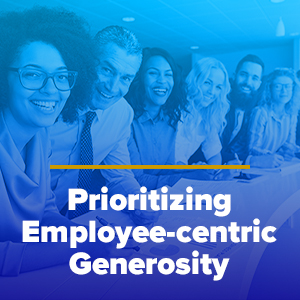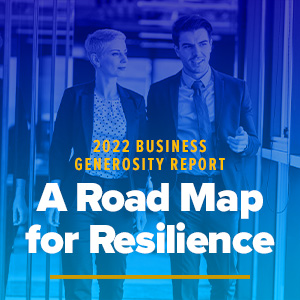Chapter Three:
Link Between Flexibility and Company Culture
Exploring the impact of remote work on company culture
As remote work became the new normal for many over the course of the pandemic, executives raised concerns about sustaining their company culture when people could not gather in an office setting. Today, worries about maintaining a coherent, compelling company culture continue to plague business leaders grappling with employee demands for flexible work options. The data suggests culture might actually be more powerful with increased flexibility.
The majority of survey respondents said that they worked either remotely or in a hybrid setting over the past two years (65% of executive respondents and 57% of employee respondents) with only 33% of executives and 43% of employees saying they were in the workplace 100% of the time. When given an array of options on how a business can best demonstrate generosity to employees, both executives and employees selected flexible work schedules as the #1 priority. As you will see in the specifics, the data suggests that employees declare more positive impressions of company culture when this primary request for flexibility is met.
Flexibility impacts recruitment & retention
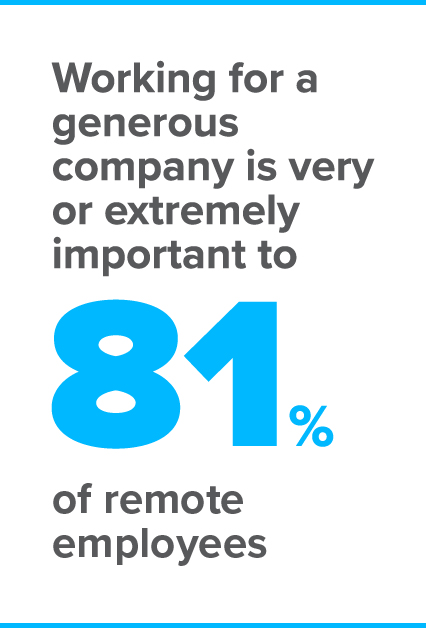
Those who worked remotely over the past two years were more likely to say that it is very or extremely important that they work for a generous company (81%). Those who worked in a hybrid setting found generosity only slightly less compelling (78%), with those who were full-time in the workplace noting the importance of generosity at 68%. Overall – this reminds us that all employees weigh generosity highly in their decisions about where to work. Yet, the more flexibility they receive, the more potent generosity efforts are in attracting and retaining employees.
For those who worked entirely remote, they were more likely to give their employer an A or B grade for their generosity efforts toward employees (74% of respondents) and gave their employer consistent high marks for generosity toward the community. This holds true for those who worked in a hybrid setting with employers maintaining an A or B grade for their generosity efforts toward employees (73% of respondents).
Flexibility also seems to play a role in convincing employees to stay at their current job. Most remote and hybrid workers factor generosity into their decision to stay in their job (both at 71%).
Here’s where a lack of flexibility starts to create a stark decline in employee attitude. For those who were in the workplace full time, generosity only influences their decision to stay 52% of the time. While this tells us generosity continues to influence people the majority of the time, the 20 percentage point decline with lack of flexibility is worth noting.
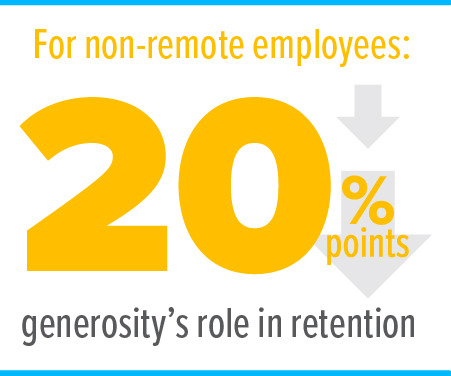
Flexibility increases effectiveness of values & purpose
COMPANY VALUES: In earlier chapters we noted that both executives and employees see company values as an important way to demonstrate business generosity internally. This study found that most respondents were aware of their employer’s stated company values (81% executives vs. 72% employees), with many believing they have a profound impact on company culture.
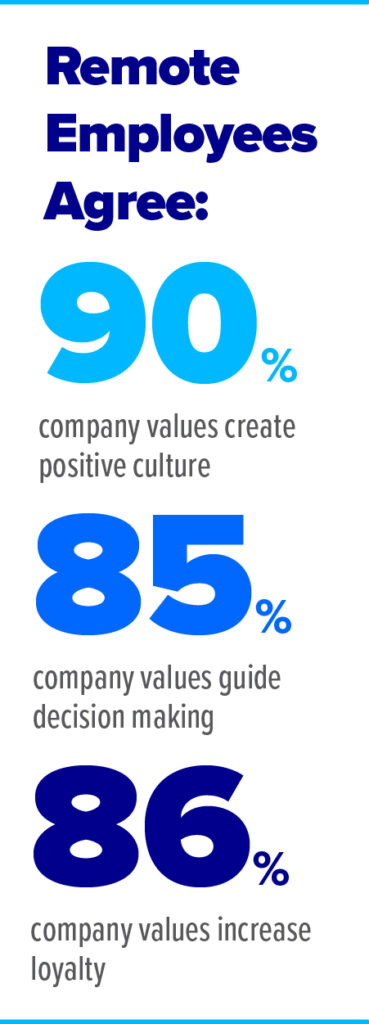
For those who are aware of their employer’s company values, they see the significant positive role company values play regardless of whether they worked remotely or were fully in the workplace. For instance, 83% of employees believe company values create a more positive culture. 77% say company values clearly guide decision making and 75% say they increase employee loyalty.
Good news, employees also agree strongly that company leaders’ performances support the values with 76% saying managers conduct aligns and 75% saying executive leadership conduct aligns with company values.
The data tells us that company values resonated more with employees who had flexibility.
An extraordinary 90% of remote workers believe company values create a more positive culture and 85% say company values help them feel more connected. A remarkable 86% of remote employees say company values increase their loyalty and they gave their managers much higher marks for their conduct with 88% saying their manager’s conduct aligns with values.
When you take a look at those employees who worked in a hybrid model, company values still maintain high marks for effectiveness with a strong 83% agreeing that company values create a more positive culture and 77% believing that values help them feel connected. 76% of hybrid workers say the values increase their loyalty and 77% say their manager’s conduct aligns.
For those who worked entirely in the workplace, their responses convey a consistently concerning trend. While 76% of in office employees say that company values have a positive impact on culture, this is a significant difference from the 90% of remote employees who hold positive feelings about company values.
For those in the office entirely, 70% say that the company values increase their sense of connectivity which is a stark difference from the 85% of remote workers who note the effectiveness of values on their sense of connection. The negative trend line continues with 68% of workplace employees saying the values increase their loyalty compared to 86% of their remote peers.
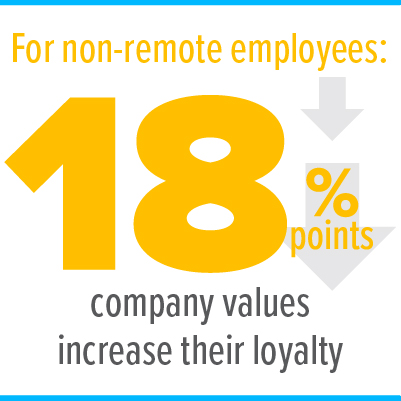
PURPOSE STATEMENT: Overall employee respondents were less aware of their employer’s purpose statement (65% of employees; 76% of executives). But the majority are aware and believe the purpose statement has a strong impact on culture with 80% of employees and 88% of executives stating that purpose statements create a more positive culture. 77% of these employees believe that the purpose statement clearly guides decisions making in their company and 69% believe the purpose inspires them in their work.
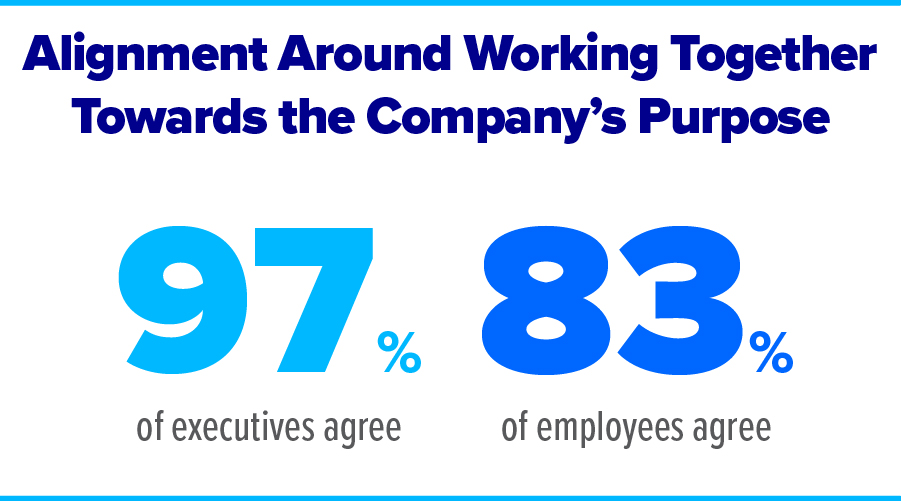
Interestingly, 97% of executives see the people in their company working together towards the company’s purpose and 83% of employees agree.
Without a doubt, flexibility increases a purpose statement’s efficacy.
As with the values statement, a remarkable 90% of remote workers claim the purpose statement has a positive impact on culture and 81% find that the purpose statement clearly guides decision making in their company.
Remote workers are more aligned with executives in their strong sense (92%) that everyone at their company is working towards the purpose and that purpose has a high likelihood of increasing their loyalty (81%).
Hybrid workers are slightly less inclined, but still a convincing 79% agree that the purpose statement creates a more positive culture. Even more than their remote peers, 85% of hybrid respondents said that purpose clearly guides decisions making. There’s a strong dip in the efficacy of a purpose statement to increase loyalty for those who worked hybrid at 63% but this is still the majority. There’s more agreement (87%) that everyone at their company is working together towards the purpose.
As with the company value statements, the purpose statement is an effective tool for company culture but there is a statistically significant trend that highlights the disconnect for those employees who worked solely in the workplace.
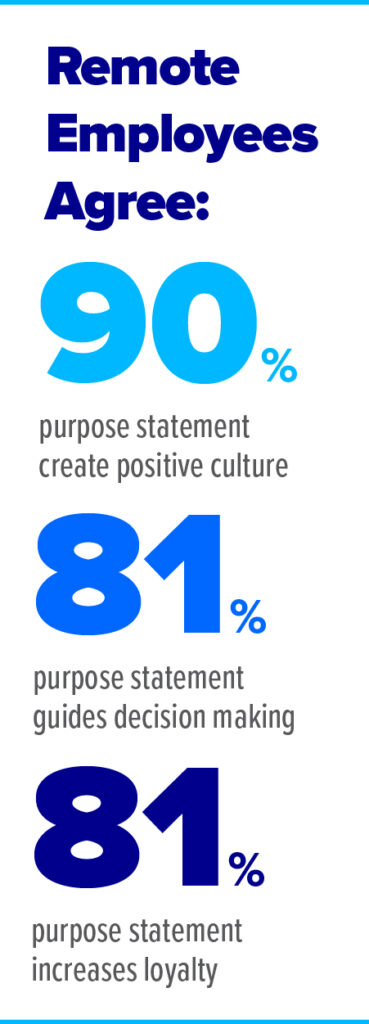
Lack of flexibility damages trust and connectivity
This study found that 39% of employees who operated solely in the workplace graded their CEO a C or lower for generous leadership. They are less likely to agree that their manager’s conduct aligns with company values (67% compared to 88% for remote) which is a red flag for retention given that 33% of respondents cited a bad manager as an influential reason for why they plan to leave their current job. And they are more skeptical about the role values or purpose play in creating a more positive culture or connectivity.
Those who worked at the workplace were also less likely to trust their CEO is putting commitments into action and less trusting of any institution to do what is right, including their own employer.
Employees want actions more than words
It’s important to note that a healthy group of employees think their employer’s company values are just for show (38%) with younger employees being even more skeptical (46%). Executives overwhelmingly disagree (86%), but this same sentiment holds when it comes to a company purpose statement. A notable number of employees (39%) consider the company purpose statement as just for show with younger employees being significantly more skeptical (50%). According to employees company values and purpose statements have a strong correlation to positive culture and their decision to stay.
The road map for success includes:
- Reinforce words found in the company values and purpose statements with concrete actions
- Prioritize generous action to employees far and above generosity toward the community
Explore further insights:
In Partnership with



